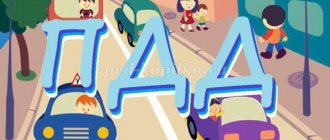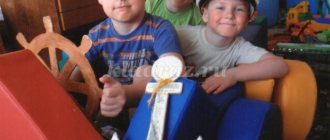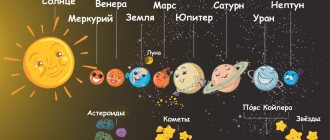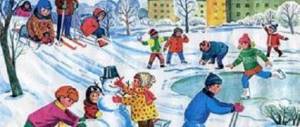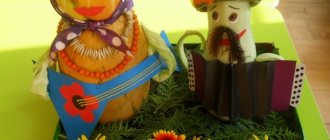Space. There is so much in this word that is alluring and interesting. Space views fascinate, captivate, it’s hard to tear yourself away from them, and knowledge about space truly interests both adults and children. Today I want to dedicate my article to space, a quiz about space for kids and older children, as well as for adults - everyone will find questions to their liking, and I’m sure they will learn a lot of new things.
space
What is a quiz?
The quiz format is often used in educational and school programs. The quiz has a game form, and as the information is easily absorbed by children and adults, it is remembered faster. The quiz involves choosing the correct answers to the questions posed. Typically, quizzes are divided by topic, in our case it will be a quiz about space , as well as by age restrictions.
If you are a teacher, then when preparing a quiz about space, do not forget about the game setting and atmosphere. Children will really enjoy not only dividing into teams, but forming crews of space rockets, as well as going on an imaginary space journey together and even meeting aliens. Prepare rewards for correct answers; these can be tokens in the form of stars, planets, or even funny aliens. Using a game form, you will not only help children gain new useful knowledge, but also bring a lot of positive emotions.
Astronaut
Space quiz for kids
A quiz about space for preschoolers should contain simple but interesting questions. You can use pictures and illustrations, children will guess the images and answer questions. For preschoolers, it would be appropriate to use riddles; children enjoy participating in such space quizzes.
Questions for space for preschoolers:
- A golden ball looked in the window, and bunnies were dancing. What is this? (Sun).
- At night, a pale-faced ... (Moon) is visible in the sky.
- Fast, like a comet, it takes off into space... (Rocket)
- What do we see when we look out the window, a bright light shines for us... (the sun)
- Golden peas are thrown into the night sky. (Stars).
- The planet flies around the Sun, covered in forests and mountains. Seas and fields flash by. It's called... (Earth).
- What is the name of the astronaut equipment? (Spacesuit)
- The rocket has a driver, a lover of zero gravity. In English: “astronaut”, and in Russian... (cosmonaut)
- To equip the eye and make friends with the stars, to see the Milky Way, you need a powerful... (telescope)
For older preschoolers, you can use the following questions about space:
- What date is Cosmonautics Day celebrated? (April 12, 1961)
- Why was this day called that? (On this day, a man flew into space for the first time)
- What animals have already been to space? (monkeys, rats, dogs)
- What animals flew into space before people and returned safely? (Belka and Strelka)
- The very first in space, a brave Russian guy, our cosmonaut, flew at great speed... (Gagarin)
First cosmonaut Yuri Gagarin
- What was the name of the man who was the first to go into outer space? (Alexey Arkhipovich Leonov)
- What was the name of the first woman to fly into space? (Valentina Tereshkova)
- How do people move in space? (in zero gravity)
- How do astronauts eat in space? (all food is in tubes)
- What planets do you know? (Jupiter, Saturn, Venus, Mars, Uranus, Mercury, Earth, Neptune)
- What character traits should an astronaut have? (strong, brave, hardy, courageous, talented, smart, fast)
- What was the name of the person who became interested in and founded space? (Tsiolkovsky)
For older children (primary school), the following questions about space are suitable.
Game - quiz in the preparatory group of a preschool educational institution on the topic: Space
Quiz game “Space travel”
Form : game. Integration of educational areas: “Cognition”, “Communication”, “Socialization”. Program content Educational objectives:
To consolidate knowledge about planet Earth and other planets of the solar system;
Systematize knowledge about astronauts and space technology; Fix the composition of the numbers 8 – 9; Introduce the constellations Ursa Major and Orion. Developmental objectives:
Develop imagination, memory, curiosity and cognitive activity.
Expand the vocabulary and vocabulary of preschoolers. Educational objectives:
Teach to protect and love your planet Earth;
Develop the ability to work in a team and a sense of responsibility for the team. Preliminary work : Introduction to the Universe, the Sun and solar system, globe, map.
Games with Dienesh blocks. Watch videos about space. Equipment and materials: Map, globe, model depicting the solar system and pictures depicting the planets of the solar system, sheets depicting the constellations Ursa Major and Orion, rocket diagram, Dienesh blocks. Contents of children's organized activities
Educator: Hello, guys! Today I invite you to play a KVN quiz game on the theme “Space”. To do this, I suggest you split into two teams. Take a seat at the tables where there are pictures like the ones on your name tags. I propose to choose the most resourceful and courageous as captains. (Teams choose captains and announce them) Educator : Well then. we met the participants and captains of the intellectual game “Cosmos”. The players of the Zvezdochek team and the Comet team are ready for the game. We declare our quiz open! (Fanfares sound). Let's see whose team will win, and this means quickly answering questions and correctly completing the tasks that are prepared for you. Tasks must be listened to carefully and completed when given a signal. For a correctly completed task or answer, the team will receive a star. The team with the most stars will win today's game. There are seven rounds in total. 1 task. "Warm-up." Educator: I will ask each team three questions; if a team finds it difficult to answer, I ask the other team this question. Name the planet we live on. (Earth) Name the model of our earth. (Globe) What do you think is indicated by blue and blue colors on the globe? (Rivers, lakes, seas, oceans). What is the name of the sheet of paper on which the earth's surface is depicted? (Map) What do you think is indicated in green, yellow, brown on the map? (Land). Name the Earth's satellite. (Luna) Educator : Well, we completed the first task, well done. Task 2 “Astronomers”. Educator: Guys, you need to correctly position the planets in the solar system. On your tables are maps and images of the Sun and planets of the solar system. Teams must line up and, taking turns running up to the table, select and glue the images of the planets in the correct order. The team that completes the task quickly and correctly wins. On the count of three, start the game. Let's count: one-two-three! (a game is being played) Educator: Look at the leaves that are on your table. Task 3 “Constellations”. The first team has a drawing of the constellation Ursa Major, the second team has a drawing of the constellation Orion. Count how many stars are in your constellations and below, under the constellation, place as many yellow, round, but not thick blocks. On the count of three, start the game. Let's count: one-two-three! (a game is played) The team that completed the task raises the flag. Educator: Well done. The constellation Ursa Major has 7 stars, and the constellation Orion has 8. Physical education lesson Let’s put our hands all together: An airplane has appeared. Flapping the wing back and forth. They leaned to the right, to the left, once and twice. One and two! Look at each other, One and two. One and two! Put your hands down and everyone sit down. Educator: 4th task “Constructing a rocket”. What do they use to fly into space? (on a rocket) Your next task is “Constructing a Rocket”. Rockets need to be assembled from Dienesh blocks. To do this, you have rocket diagrams and hints symbols of block properties (color, shape, size). Be careful and try to assemble correctly. Educator: Well done guys, you made strong, beautiful rockets. Feel free to move on to the next task. Task 5 “WHO IS FASTER?” Educator: When the crew is ready for the flight, the countdown begins for the rocket launch. Each team will receive task cards. You need to put the missing numbers in the empty cells. The team that completes the task faster and correctly wins. On the count of three, start the game. Let's count: one-two-three! (a game is played) When you have completed the task, pick up the flag. 1 3 4 6 8 10 2 4 5 7 9 6 task. “Captains Competition” Educator: Now I’m announcing a quick survey for captains. You need to answer quickly and briefly. All children support their captains. 1. How many planets are there in the solar system? (9 planets) 2. Is the sun a star? (yes) 3. Name the largest planet. (Jupiter) 4. Who was the first to fly into space? (Yu. Gagarin) 5. What is a cosmodrome? (the place from which rockets take off). 1. What is space? (the space surrounding the earth) 2. Name the planet located between the Earth and Jupiter. (Mars) 3. Which woman was the first to go into space? (V. Tereshkova) 4. Name the ninth planet. (Pluto) 5. Dogs that have been in space. (Belka and Strelka) Educator : Well done captains, they quickly completed the task. Task 7 “Cheerful Alien” Educator: I suggest each team draw a portrait of an alien. The team with an interesting completed work will win. On the count of three, start drawing. Let's count: one-two-three! (children draw a portrait of an alien) Educator: Our quiz has come to an end. Captains, count your stars. Next comes the award ceremony for the winners. (medal presentation)
We recommend watching:
Summary of NNOD in the preparatory group. Cosmonaut is a heroic profession Synopsis of an integrated lesson in the preparatory group. A rocket flies into space Synopsis of an integrated lesson for Cosmonautics Day in kindergarten. Preparatory group Summary of the lesson on FEMP in the preparatory group for Cosmonautics Day
Similar articles:
Cosmonautics Day in kindergarten. Preparatory group
Quest for Cosmonautics Day for older preschoolers
Space exploration quiz
Another interesting quiz for students in grades 1-3. Questions about space exploration will be interesting. We are sure that after such a space quiz, parents will be answering their children’s tricky questions for a long time.
- What device is used to study the starry sky? (Telescope).
- What is the name of a special device that can move on the surface of the Moon? (Lunokhod).
- What is the name of the place from which rockets are launched? (Cosmodrome).
- What was the name of the first cosmonaut - give his full name. (Yuri Alekseyevich Gagarin).
- When was the first time a person flew into space? (04/12/1961).
- What was the name of Gagarin's ship? ("Voskhod-1").
- How many times did he circle the globe Yuri Gagarin? (Once).
- Who was the first to leave the ship into outer space? (Alexey Leonov).
- What other astronauts do you know? (German Titov, Andrian Nikolaev, Vladimir Komarov),
- The name of the person who first walked on the surface of the Moon. (Neil Armstrong).
- The name of the first female astronaut? (Valentina Tereshkova).
Milky Way
Quiz on the topic: Space for older preschoolers with answers
Quiz with answers for children of senior preschool age “Journey to the stars”
Author: Pavlushko Oksana Mikhailovna, teacher of the Omsk BDOU “Kindergarten No. 204 of a combined type” The quiz is designed: for children of senior preschool age. Objectives: to intensify the cognitive activity of children; develop memory, attention, and the ability to quickly find an answer. It's so cool in space! Stars and planets In black weightlessness Float slowly! It's so cool in space! Sharp rockets at great speed, rushing here and there! It's so wonderful in space! It's so magical in space! Been to real space once! In real space! In the one that saw through, In the one that saw through a paper telescope! O. Akhmetova.
1. What is the name of the path that celestial bodies take around other space objects? 1) highway 2) road 3) orbit 4) path
2. What is the name of the place from which a space rocket launches? 1) airfield 2) cosmodrome 3) race track 4) velodrome
3. Name the dogs that were the first to make 17 full revolutions around the Earth and successfully withstand overloads. 1) Fluff and Ball 2) Belka and Strelka 3) Rex and Mukhtar 4) Tuzik and Zhuchka
4. What is the name of the astronaut suit? 1) armor 2) pajamas 3) spacesuit 4) tailcoat
5. Who was the first person to fly around the Earth? 1) A. Leonov 2) S. Korolev 3) Yu. Gagarin 4) V. Tereshkova
6. Which planet is the coldest? 1) Saturn 2) Neptune 3) Uranus 4) Pluto
7. What was the name of the spaceship on which Yuri Alekseevich Gagarin made the world’s first flight around the Earth? 1) Vostok-1 2) Eagle 3) Sputnik-1 4) Chaika
8. A group of stars is…. 1) collection 2) constellation 3) meteorite 4) comet
9. What is the name of the astronomical building in which scientists observe and study the stars? 1) lighthouse 2) observatory 3) tower 4) high-rise building
10. Which planet has the highest mountains? 1) Uranus 2) Earth 3) Mars 4) Venus
11. What is the name of a stone that fell from space? 1) satellite 2) star 3) comet 4) meteorite
We live in an era of scientific and technological progress. The rapid development of physics and astronomy is leading us to the unknown secrets of the Universe. Cosmonautics sounds proud. The tremendous successes of astronautics have attracted the attention of various strata of society in almost all countries and continents. Astronautics leaves no one indifferent. More and more countries are joining space exploration.
We recommend watching:
Abstract of GCD in kindergarten in the senior group on the topic: Space Summary of GCD in the preparatory group on the topic: Space Conversation on the topic of Space in the senior group
Similar articles:
Conversation for children of the preparatory group “Stars and Constellations”
Conversation about space in the senior group
A fairy tale about space for preschool children 5-7 years old
Game travel through the planets of the solar system for older children
Counting books on the theme “Space” for children
Space quiz “Yes or no”
Another type of question that can be used in quizzes. Children can answer Yes or No, depending on the question. Here is another example of a space quiz for elementary school children:
- Is the sun a star? (Yes).
- The sun is larger in size than other stars. (No).
- Stars are so tiny because they are very far away. (Yes).
- Absolutely all stars emit light. (Yes).
- Does the Greek word for planet mean "wandering star"? (Yes).
- Are “Universe” and “Galaxy” the same thing? (No).
- Only our planet has its own satellite? (No).
- Not only the Sun has its own system, but also other stars. (Yes).
- People have already been to Mars. (No).
Games, competitions, relay races for Cosmonautics Day
Natalia Chernikova
Games, competitions, relay races for Cosmonautics Day
Cosmonautics Day is coming soon. Activities dedicated to this event will be held in kindergartens. You can organize themed leisure activities and include games, competitions and relay races.
Outdoor game “Fast rockets are waiting for us”
Attributes: hoops
Rocket hoops are laid out around the hall. There are several of them less than the number of children playing.
Children stand in a circle, hold hands and walk in a circle. Say the words:
Fast rockets are waiting for us
For flight to planets.
Whatever we want
Let's fly to this one!
But there is one secret in the game:
There is no room for latecomers!
Afterwards, the children run away and try to take a place in the rocket. You can agree in advance that one rocket can accommodate, for example, 2 or 3 people, depending on the number of players. Those who do not have enough space are eliminated from the game.
Competition “There is a lot of garbage on the space station”
Attributes: crumpled pieces of paper, wooden bricks, cardboard figures, 2 hoops
Rubbish is scattered on the floor. Children are divided into 2 teams. At the leader’s command, they begin to collect garbage and take it to their garbage container - a hoop. At the end, the results are summed up: the number of collected items is counted. The team that collects the most garbage on the space station wins.
Competition "Who will collect the most stars"
Attributes: rope, stars made of colored cardboard (yellow, red, blue and green, made using the origami technique), 4 baskets of the same colors, headbands in 4 colors.
Throughout the hall there are stars suspended from ropes. Children are divided into teams, each team has a basket of a certain color, and children have colored headbands on their heads. Team of green, blue, red and yellow. At the leader’s command, the participants begin to collect stars, tearing them off the rope. Summing up, they check whether the stars are collected correctly by color and count their number.
Game "Aliens and Earthlings"
(based on the principle of the game “We won’t tell you where we were, but we’ll show you what we did”)
Two teams of children are participating. One team is the inhabitants of planet Earth, the other is aliens. In turn, each team guesses a movement, the other guesses. For example, children can make a guess that their stomach hurts, that they are doing exercises, eating, sleeping, etc.
Competition “Launch a rocket into space”
Attributes: 2 toys - winder with rockets
Children participate in pairs. They are asked to wrap a string around a stick at speed, thereby lifting the rocket up, i.e., launching it into space.
Relay race "Exit into space"
Attributes: 2 tunnels, 2 large hoops
1 option
2 teams are participating. Children line up in 2 columns. This is 2 crews. There is a tunnel in front of each carriage. On command, team members climb through the tunnel one after another, run around it and return to their teams, standing at the end of the column.
Option 2
2 teams also participate. The crew of each team stands in a line, holding hands tightly. Teachers hold hoops at a distance of 2 m from each crew. The task of each team is to pass sideways through the hoop without releasing their hands. The team that completes the task first wins.
Space quiz for middle school students
meteor shower
If children already know the answers to all the above questions very well, you can move on to quizzes for middle school students. Children in grades 5-7 will be interested in formats similar to television shows, for example, “What? Where? When?" etc. That is, the questions are open-ended and the children themselves must choose the answers to them. Here are examples of such a quiz:
- What is the translation of the word “cosmos” from Greek? (Universe, Universe).
- Is it true that all stars are red like the Sun? (No).
- What is the name of "shooting stars"? (Meteora).
- What is the name of a stone if it came to the planet from space? (Meteorite).
- What affects the color of a star? (Her temperature).
- What color is the hottest star? (White or silver, bluish).
- What color are cool stars? (Red).
- Are planets hot or cold celestial bodies? (Cold).
- What is the name of a celestial body that revolves around the Sun and has a tail? (Comet).
- Where do black holes come from? (They appear where an old star exploded).
Quiz What is your name?
An interesting format for space quizzes would be guessing famous names of people who contributed to the development of cosmonautics and astronomy.
- Who is called the father of astronautics? (Tsiolkovsky).
- Who was the first to explore space using a telescope? (Galileo).
- Which ancient Greek scientist was the first to claim that the Earth is spherical? (Pythagoras).
- The name of the aircraft designer who designed the first rockets? (Korolyov).
- The first dog to fly into space and never return? (Laika).
- He was the first to argue that the Earth is not the only planet and they all revolve around the sun. (Copernicus).
- Cosmonaut call sign "Kedr". (Gagarin).
Quiz for adults and high school students
Of course, space is of interest not only to children and primary school students; students in grades 9-11 also enjoy participating in quizzes and competing in erudition. A quiz about space will refresh your knowledge and allow you to show your ingenuity. Here are some interesting space questions for adults:
- What date is considered the beginning of the era of astronautics? (Launching of the first satellite on October 4, 1957).
- How long did Gagarin spend in space? (108 minutes).
- How do stars differ from planets in appearance? (The planets emit an even light, and the stars twinkle).
- What is the name of the science that studies the Universe? (Astronomy).
- What is larger - the Universe or the Galaxy? (The Universe, Galaxies are its components).
- The name of the galaxy we live in? (Milky Way).
- How often is a new star born in the Universe? (Once every 20 days).
- How many meters was the first satellite? (0.58m=58 cm).
Menu, serving
Sandwiches for a couple of bites, cold cuts, fruit, cocktails, canapés - a classic buffet. The menu will suit whatever suits your guests’ tastes. But you will have to work hard on the design:
- You can buy dishes for a space party or make them yourself by decorating simple disposable plates and glasses with rocket stars;
- thematic cards, flags, silhouettes of astronauts and UFOs will be useful for decorating skewers and cocktail straws;
- The real space food will surely amaze your guests! You can order via the Internet or make an imitation (soft tubes of baby puree, yoghurt + themed stickers);
- come up with names for some dishes. Cocktails “Black Hole”, “One sip to a star”. Salads “Nuclear Mixture”, “Supernova Explosion”. Cakes “Sugar Nebula”, “Cosmic Temptation”. Make cards, change boring bottle labels;
- cut vegetables, bread, fruits, hams and cheeses into the shapes of stars, rockets, planets;
Surprise your party guests with “space” products - vegetables and fruits of unusual colors: yellow and black tomatoes, white and black carrots, white cucumbers, purple cauliflower, etc. All this is sold in the markets, you just need to look.
- molecular cuisine will come in handy! Almost real alien dishes - you won’t guess what’s on the plate. For a dish from a chef from distant Jupiter, exotic fruits, sauces, and drinks of unusual colors will do;
- make decorations for cakes , cupcakes, cookies in a themed form from mastic. It's as simple as sculpting from plasticine! Natural juices and food coloring are suitable for coloring.
For your birthday, be sure to order a space-themed cake , especially if you are planning a party for children - the kids will surely remember such a masterpiece dessert for a long time!
Entertaining tasks
A quiz is a test of knowledge, good memory and erudition. She can also use logic. To do this, use entertaining tasks about space. You can use the following tasks:
- Will an astronaut be able to pour water from one glass to another while in orbit? (No, since there is zero gravity in space).
- What is more useful in space to maintain good physical shape: dumbbells or an expander? (An expander, since stretching the springs will still require effort).
- Would a compass be useful on the lunar surface? (No, there is no magnetic field there).
- Is it possible to see Ursa Minor from the surface of Venus? (No, the sky on this planet is always covered with dense clouds).
We are sure that the space quiz will be interesting to people of all ages. Fun riddles for kids, tricky questions for adults and interesting questions with answers for middle school children. We hope that our questions and riddles about space will be useful to you and will turn Cosmonautics Day or just a lesson in space exploration into an exciting activity from which everyone will receive a huge amount of benefit and pleasure.
Share in the comments how you passed the space quiz? How many points did you score? Which question did you like best?
